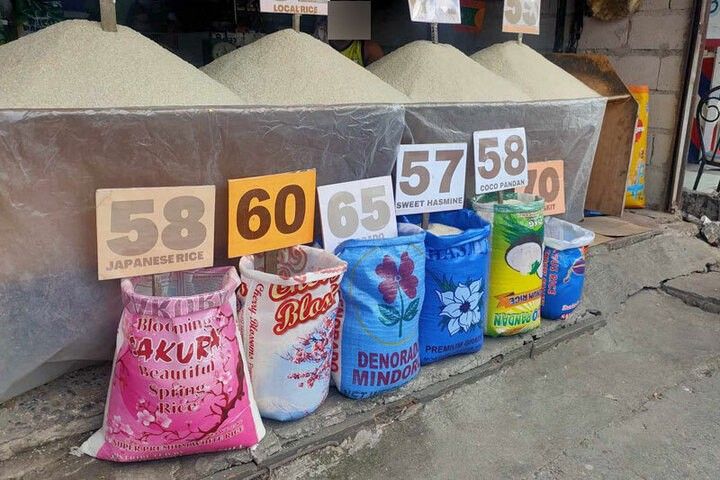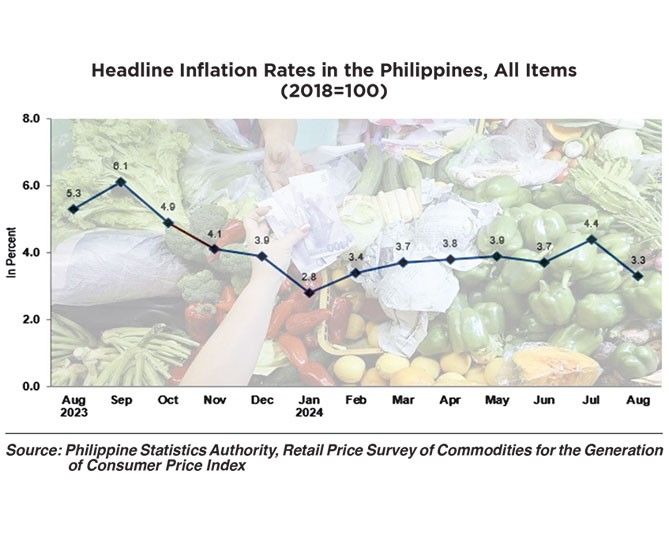Inflation falls to 7-month low

At 3.3% print, returns within BSP’s target band
MANILA, Philippines — Overall inflation eased to a seven-month low in August due mainly to the slower increase in food prices, according to the Philippine Statistics Authority (PSA).
National Statistician Dennis Mapa said in a press conference yesterday that headline inflation, or the rate of increase in average prices of consumer goods and services, slowed to 3.3 percent in August this year from 4.4 percent in July and 5.3 percent in August 2023.
This is the slowest since the 2.8 percent inflation print in January this year.
The August inflation is also within the Bangko Sentral ng Pilipinas’ forecast range of 3.2 to four percent for the month and falls back to the three to four percent target band for the year.
Driving the downward trend in inflation was the slower annual increment of food and non-alcoholic beverages at 3.9 percent in August from the previous month’s 6.4 percent.
Food inflation eased to 4.2 percent in August from 6.7 percent in July.
The National Economic and Development Authority (NEDA) attributed the lower food inflation largely to the significant slowdown in rice inflation, which decreased to 14.7 percent in August from 20.9 percent in July.

Mapa said this was the slowest inflation for rice since the 13.2 percent in October last year.
He said the slower rice inflation in August was in line with expectations, citing base effects and the impact of the lower tariffs on rice imports.
Mapa said the average prices of the three varieties being tracked by the PSA also declined in August from their levels in July.
In particular, the average price of regular milled rice declined to P50.66 per kilo in August from P50.90 per kilo in July. For well-milled rice, the average price also decreased to P55.56 per kilo in August from the previous month’s P55.85 per kilo, while the average price for special rice dropped to P64.08 per kilo in August from P64.42 kilo in July.
“This month of September, (rice inflation) will further go down to single digit because of base effect,” Mapa said.
The PSA hopes to see bigger drops in rice prices this month and in October, he said.
Also cited as a main driver of the slower headline inflation was the transport commodity group, which posted a 0.2 percent drop in August from a 3.6 percent increase in July.
In the January to August period, inflation averaged 3.6 percent, within the government’s two to four percent target range for the year.
“There are factors, there are items that are going up, some are going down. But overall, for now, the direction is that (headline inflation) will go down, except if we have some surprises this month of September,” Mapa said.
Rizal Commercial Banking Corp. chief economist Michael Ricafort said it is possible for the inflation level to be sustained at three percent for the rest of the year.
“However, there could still be spillover effects on inflation by the storm or flood damage by Typhoon Enteng and the recent habagat,” he said in an email.
While potential pressures could emerge from higher electricity rates and above-normal weather disturbances, NEDA Secretary Arsenio Balisacan said the government is prepared to address these.
“Preparations to counter the effects of the La Niña phenomenon are underway, including improvements in early warning systems, the utilization of communication systems to issue warnings about dam openings, measures to address the potential accelerated speed of livestock diseases and greater involvement of local government units in information dissemination are in progress. Notably, the government has allocated P15 billion for national risk reduction in 2024,” he said.
Measures to ensure steady inflation include the expansion of the Department of Agriculture’s Kadiwa ng Pangulo program in the Visayas and Mindanao to enhance access to affordable agricultural products, and the collaboration with food manufacturers to supply Kadiwa stores with essential goods, including canned sardines, cooking oil, condiments, fresh fish and poultry.
To promote greater reliability and more affordable electricity, the NEDA is urging the Energy Regulatory Commission to expedite the full implementation of the lower retail competition and open access threshold.
“The government will continue to implement measures to reduce further inflationary pressures, including enhancing agricultural productivity, expanding logistics infrastructure and ensuring the efficient delivery of social services. These efforts are crucial not only for stabilizing prices, but also for ensuring that economic growth translates into tangible improvements in the lives of all Filipinos,” Balisacan said.
- Latest
- Trending




























